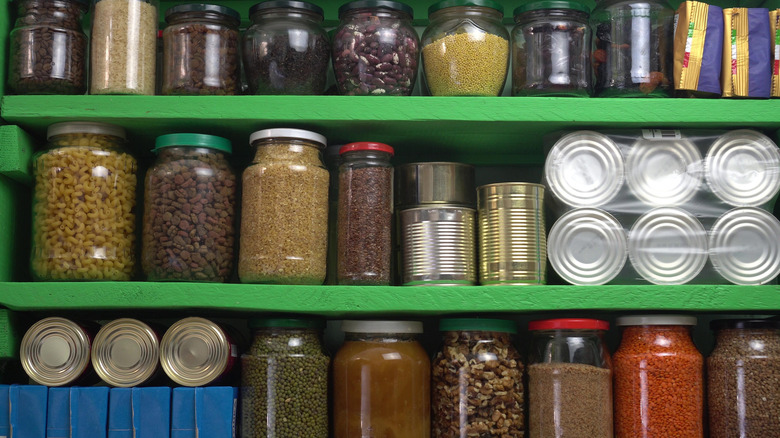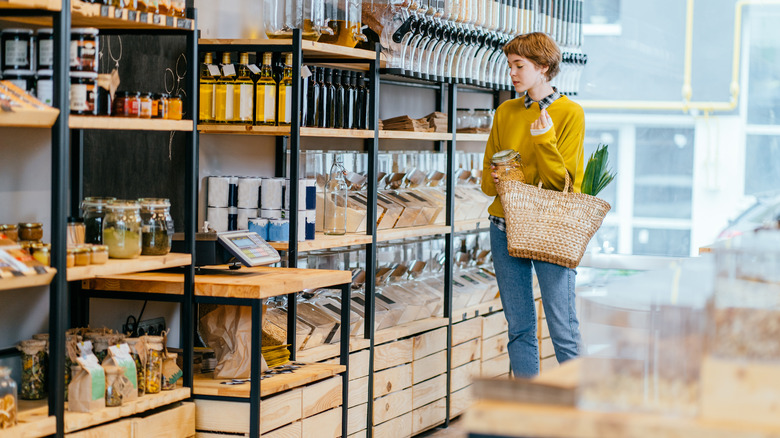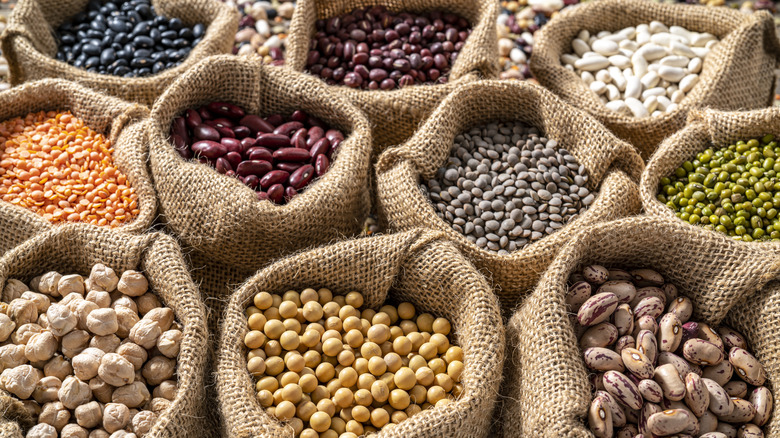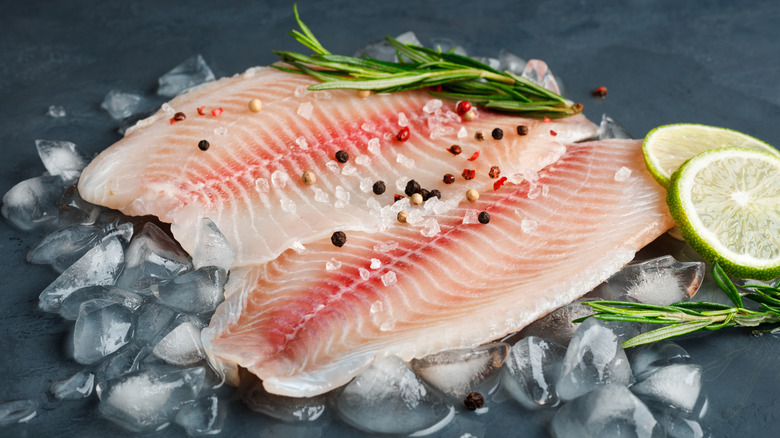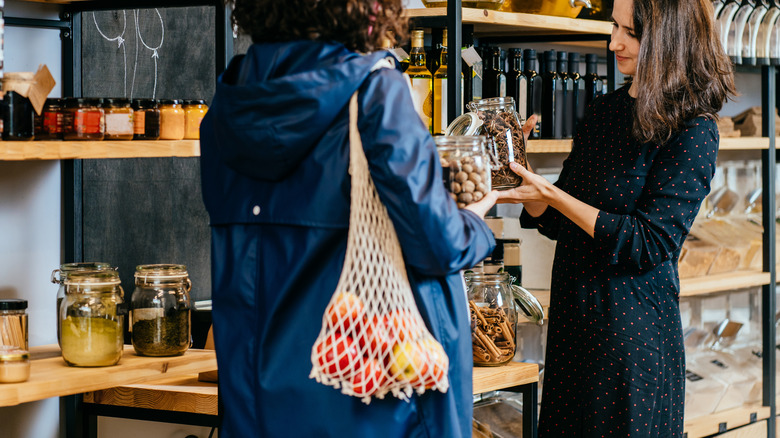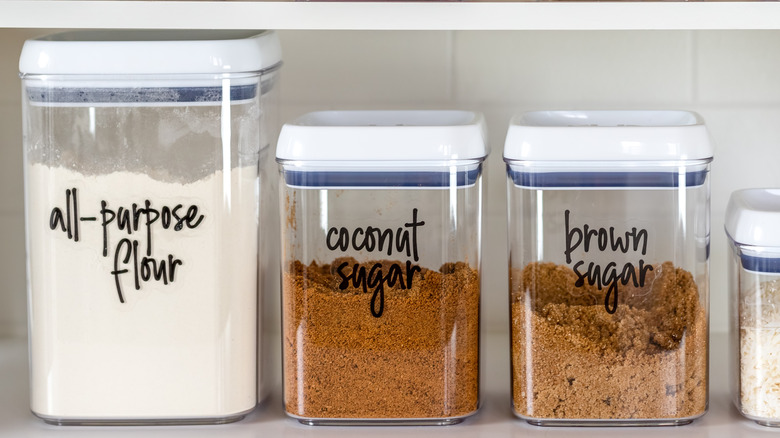How To Buy Food In Bulk And Save Money
Buying food in bulk has long been practiced by large families and those preparing for disasters. However, this method of shopping has evolved over the years as we've experienced inflation and learned more about sustainable shopping habits. Stocking up on certain items no longer only pertains to large families who are too busy to hit the grocery store every week. Even small families or single individuals can buy in bulk and save money.
In addition to cutting back on your grocery bill, buying food in bulk offers a range of benefits. For example, reducing individually packed items or small packages can limit waste and decrease your environmental footprint. Buying extra items can also cut out a few trips to the store, saving you time and energy. And finally, having extra staple items in your pantry can decrease stress. Feel at ease, knowing that you have what you need on hand in case of an emergency or during tough times, such as losing your job unexpectedly or another pandemic.
Buying in bulk is not a given, and unfortunately, stocking up is not always financially possible for some families. However, there are a few tips and tricks to consider if you're interested in trying the bulk method or if you want to perfect your system of stocking up. Here's how you can decide what to buy in bulk and where to buy it from to how to store it and prevent waste.
Should you buy food in bulk?
Buying food in bulk is not for everyone, and a few minor mistakes can end up being a costly mess. Before you explore the further tips and tricks for this method of buying, consider asking yourself a few questions. Can you afford the higher upfront cost? It's important to take the time to make a budget. One common mistake is spending too much on a few items and realizing too late that the cost was outside your budget.
Next, ask yourself if you have the space to store bulk food items safely. For example, is your freezer jam-packed already, or is your pantry overflowing? Storing items in the refrigerator is not always sufficient, and freezer space might be a must to keep it from expiring. In addition, do you have airtight containers or bags that you can spare for long periods of time? Certain food products need to be kept in a cool, dry place. It's also crucial that you keep bulk food items organized to prevent large amounts of food from spoiling.
Finally, are you going to be able to use the bulk food items before they expire? If you're planning to stock up on dehydrated lima beans because they are on sale, but you and your family hate them, there are other items you should focus on. Consider these simple questions and plan accordingly before diving into bulk buying.
What to look for when buying food in bulk
When buying in bulk, it can be difficult to know what to look for as you're starting out. The best practice is to look for these specific details and understand what they mean. To begin, always look at the expiration date, especially on sale items. If you notice a big mark down, double-check the date because chances are that the food is going to expire soon, and the store is hoping to unload it quickly.
Many factors can influence the expiration date, and the labels can be confusing at times. For example, familiar labels such as best used by and sell by dates are not set for safety reasons. These dates describe the peak flavor and when stores should stop displaying an item. The more important labels include use by and freeze by, which refer to when to use or freeze an item to experience the best quality flavor and texture of the food. Always take the dates into consideration when buying in bulk, and double-check that food hasn't expired by inspecting it carefully before consuming, according to the USDA.
You should also pay attention to the bulk food packaging. For example, cardboard or paper containers might need to be replaced with more secure packaging to keep them fresh. Airtight plastic or glass containers work best, as they prevent moisture and pests. Finally, consider your climate. Most food should be stored at around 59 degrees Fahrenheit, and you might need to make adjustments to maintain that.
Best foods to buy in bulk
Buying food in bulk and saving money can be a tricky process, but there are certain items to look for to get you started. The trick is to purchase products that have a long shelf life and are less likely to expire before you can enjoy them.
Dried beans and lentils are an excellent option to begin your bulk-buying journey. These items can typically last on your shelf for up to one year if stored in the right place. In addition, they can easily serve as a hearty addition to any meal, especially when added to soups, stews, or as a savory side dish. Beans and lentils can also be a source of vitamins and minerals, fiber, and potassium.
Don't forget to add dried fruits to your shopping list when stocking up. This is another option that will last approximately a year when stored in a dry, cool place. Dried cranberries, mango, and more work perfectly as a snack or can be added to granola, cereal, and oatmeal. When fresh fruit isn't available, this option can be a great alternative to have on hand.
Other items with a long shelf life include oats and grains, which are typical staple items and are less likely to go bad. Peanut butter is a satisfying, healthy snack to stock up on. In addition, butter, dried pasta, as well as items that freeze well are smart options.
Worst foods to buy in bulk
Of course, some items might be tasty but don't always make sense for buying in bulk. Consider skipping over items that naturally do not have a long shelf life or if they will be difficult to store. Finally, don't bother buying products you and your family don't enjoy. Even if these items are on sale, they're more likely to spoil and go uneaten, costing you more money in the long run.
First on the list of items not to buy in bulk is frozen fish. Although the product won't likely spoil, freezing it for long periods of time can decrease the flavor unless it's vacuum sealed, and still, it won't last more than 3-6 months.
It might also sound like a smart idea to load up your freezer with a staple item like milk, but unfortunately, freezing it can alter the texture. As the fat in milk separates, it can develop a somewhat grainy texture that doesn't go great in a bowl of cereal or in a cup of coffee.
Another common product that might tempt you is cooking oil. Even though you might use a lot in your kitchen and they don't require refrigeration, these products expire, and you might not always be aware. Everything from air, heat, moisture, and even light can speed up the expiration of your oil. Big containers of snack items, such as chips, crackers, and pretzels, are also not an excellent bulk choice. These large containers will quickly go stale once opened.
Where should you buy food in bulk?
Finding the best place to buy bulk food for the right prices can be daunting. However, there are excellent resources online to guide you that have already undergone the research. Many convenient websites provide a list of the top places to buy bulk food based on each state. Search for locations near you to find new options for stocking up.
More common choices are big box stores, such as Costco, Walmart, and Big Lots. These stores often have great prices, although they're not available in every city, and sometimes charge membership fees. In addition, lesser-known stores or smaller businesses sometimes offer discounts on bulk items, such as dried beans and grains, and local products like honey, nuts, and dried fruit. With a little research, you can find the best bulk options in your town and also support small, local businesses in the process.
For convenient online shopping, sites offer many options that can be delivered right to your door. However, don't forget to check for local co-ops in your community as well, on Facebook pages and community forums. These can be a great way to buy food in bulk, get to know your community, and save money.
Where to buy organic food in bulk online
There are seemingly endless opportunities online to buy in bulk; however, organic, gluten-free, vegan, and other options are harder to navigate. A great place to start is Thrive Market. This online platform is a popular option for those looking for organic and non-GMO foods. For a small membership fee, Thrive Market will price match, offer dairy-free or keto options, and ship items directly to your door.
Another top choice is Azure Standard, which provides an extensive selection of organic produce, as well as other items like grains, flours, and spices in bulk for fair prices. For high-standard cuts of meat, consider Butcher Box, which is another membership opportunity that will ship various types of meat to your door. Make holidays and gatherings a breeze with free-range organic turkeys, spiral hams, and more that will save you money without compromising quality. For those looking to stock up on grains and other pantry staples, Frankferd Farms sells top brands, and convenient shipping can be arranged.
When it comes to fruits and vegetables that can be frozen, canned, dehydrated, and more, Misfits Market provides quality products without an overwhelming price tag. This innovative brand utilizes products that traditional grocery stores might turn away for their appearance but are still safe to eat. For bulk buyers who have a knack for canning and dehydrating products, this could be the answer for you.
Have a plan when buying food in bulk
If your plan is to effectively buy food in bulk and save money at the same time, then a bit of planning and preparation is crucial. First, consider buying brands that you know and love. If you don't enjoy eating the products, they're much more likely to expire before you have the time to eat them.
Another important factor to remember is variety. To stay truly prepared, a combination of canned, frozen, dehydrated, and vacuum-sealed items will help prevent mishaps, especially in an emergency.
Budgeting is also critical when buying food in bulk. Assess your finances and determine a reasonable amount that you can spend on bulk food items upfront. Stick to this budget and avoid impulsive purchases that may overspend your budget. Planning your meals ahead of time is another strategy that will help you avoid wasting food and spending too much.
Finally, buying smart does not necessarily mean overstocking your pantry. Start slowly and buy products you know you're going to use. You can always replenish your stock at a later date while still saving money.
How to store food you buy in bulk
Buying food in bulk is just the beginning when it comes to saving money. It's equally important to store that food correctly to keep it fresh for as long as possible. The first step begins with your container. Choose airtight containers that are made of materials that won't react with the food, such as glass or high-quality plastic. Mylar bags, gamma seal lids, and glass jars are ideal options.
Next, remember to label everything clearly and concisely, with the product name, the date of purchase, the expiration date, and any other important storage information. This will help you stay organized and know when an item is approaching its expiration date.
When storing food, temperature is just as important as the container. Consider the climate throughout the year and find a cool, dry, dark place in your home where the food won't be exposed to fluctuating temperatures. This could be a basement, pantry, or a dedicated storage room. If you live in an area with high humidity, consider investing in a dehumidifier to reduce moisture levels and prevent mold growth.
Finally, have a backup plan in case of power outages or other emergencies. Invest in a generator to keep your refrigerator and freezer running. Above all, remember to rotate your stock, using the oldest products first and replacing them as you go. With these simple steps, you can successfully store bulk food for months or even years.
